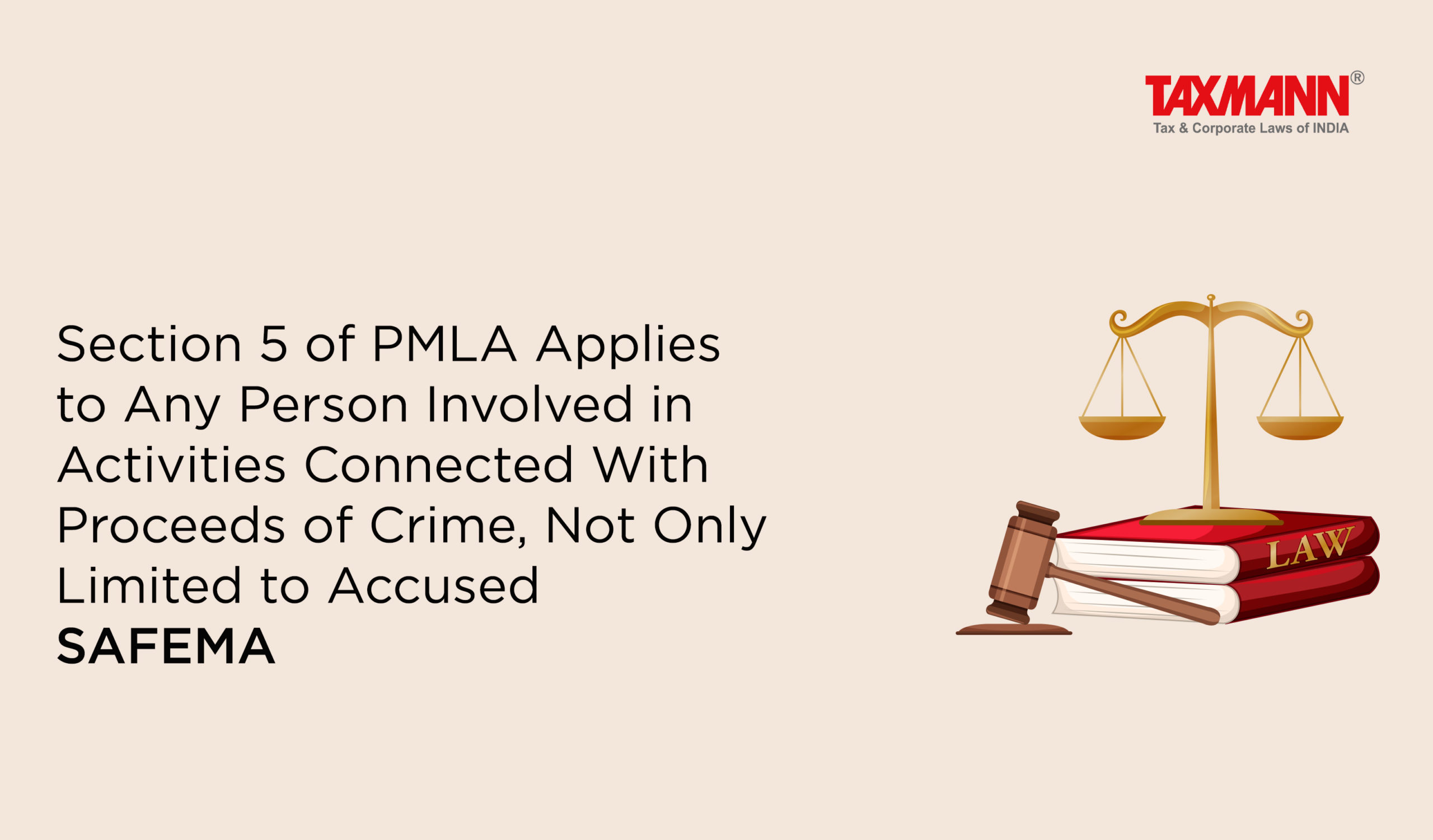Section 5 of PMLA Applies to Any Person Involved in Activities Connected With Proceeds of Crime, Not Only Limited to Accused | SAFEMA
- Blog|News|FEMA & Banking|
- 2 Min Read
- By Taxmann
- |
- Last Updated on 8 August, 2023

Case Details: Smridhi Sponge Ltd. v. Deputy Director, Directorate of Enforcement, Lucknow - [2023] 152 taxmann.com 407 (SAFEMA-New Delhi)
Judiciary and Counsel Details
-
- V. Anandarajan & Rajesh Malhotra, Member
- Devesh Poddar & Shubham Aggarwal, Advs. for the Appellant.
- Mrinal Kumar, Counsel for the Respondent.
Facts of the Case
In the instant case, the orders of provisional attachment of properties of the appellant company were passed u/s 5 of the Prevention of Money Laundering Act, 2002. It was alleged that the Chief Minister of Jharkhand, during his tenure had misused his official position in connivance with one ‘BS’ and certain other persons and amassed assets in excess of his income from legitimate sources.
It was further alleged that ‘BS’, with the help of his close associates attempted to change the colour of tainted money by way of fictitious share application money, or through other accommodation entries through paper companies including the company ‘Creative Fiscal’.
The appellant company was alleged to be one of the companies in which proceeds of crime were invested by ‘BS’ through ‘Creative Fiscal’. The respondent, thus, attached fixed assets of the appellant company. The Adjudicating Authority (NCLT) confirmed the attachment order.
It was noted that the appellant company, while claiming that it was not benefitted in any way from the transaction between Creative Fiscal and four companies, sought to gloss over the important fact that proceeds of crime were infused into the appellant for the purpose of layering tainted money.
Appellate Tribunal Held
The Appellate Tribunal observed that the sweep of section 5(1) is not limited to the accused named in criminal activity relating to a scheduled offence, it would apply to any person (not necessarily being accused in scheduled offence), if he is involved in any process or activity connected with proceeds of crime.
The Appellate Tribunal, further observed that the definition of proceeds of crime under section 2(u) takes within its ambit not only property derived or obtained directly as a result of criminal activity related to a scheduled offence but also property derived or obtained indirectly as a result of criminal activity relating to a scheduled offence, and also the value of such property.
The Appellate Tribunal held that since the impugned order constituted sufficient material for the director or other competent officer to have the requisite reason to believe for provisional attachment under section 5, an appeal against the impugned order passed by the Adjudicating Authority attaching fixed assets of the appellant worth Rs. 6.65 crore was to be dismissed.
List of Cases Reviewed
-
- Vajay Madanlal Choudhary v. Union of India [2022] 140 taxmann.com 610 (SC) (para 28) followed.
List of Cases Referred to
-
- B. Rama Raju v. Union of India [2011] 12 taxmann.com 181/108 SCL 491 (AP.) (para 13)
- Baldev Raj Arora v. Dy. Director, Directorate of Enforcement [FPA/PMLA/2568/LKW/2019, dated 6-5-2019] (para 16)
- Vajay Madanlal Choudhary v. Union of India [2022] 140 taxmann.com 610 (SC) (para 17).
Disclaimer: The content/information published on the website is only for general information of the user and shall not be construed as legal advice. While the Taxmann has exercised reasonable efforts to ensure the veracity of information/content published, Taxmann shall be under no liability in any manner whatsoever for incorrect information, if any.

Taxmann Publications has a dedicated in-house Research & Editorial Team. This team consists of a team of Chartered Accountants, Company Secretaries, and Lawyers. This team works under the guidance and supervision of editor-in-chief Mr Rakesh Bhargava.
The Research and Editorial Team is responsible for developing reliable and accurate content for the readers. The team follows the six-sigma approach to achieve the benchmark of zero error in its publications and research platforms. The team ensures that the following publication guidelines are thoroughly followed while developing the content:
- The statutory material is obtained only from the authorized and reliable sources
- All the latest developments in the judicial and legislative fields are covered
- Prepare the analytical write-ups on current, controversial, and important issues to help the readers to understand the concept and its implications
- Every content published by Taxmann is complete, accurate and lucid
- All evidence-based statements are supported with proper reference to Section, Circular No., Notification No. or citations
- The golden rules of grammar, style and consistency are thoroughly followed
- Font and size that’s easy to read and remain consistent across all imprint and digital publications are applied



 CA | CS | CMA
CA | CS | CMA
